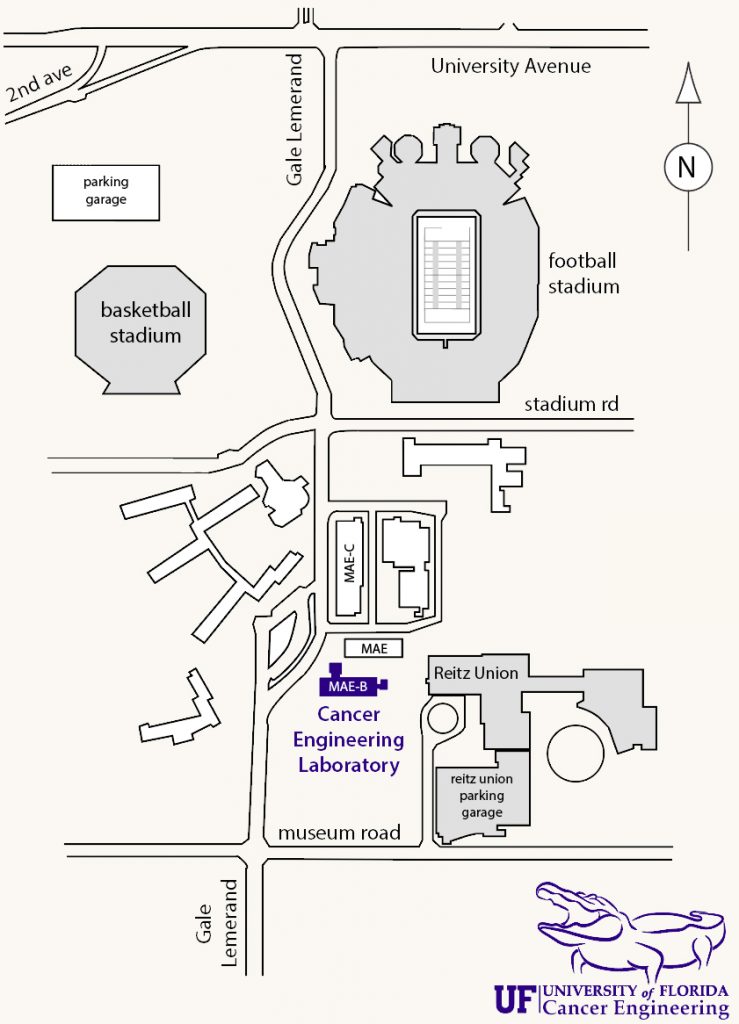Graduate StudentsNickolas Diodati |
Post Doctoral AssociatesDiego I Pedro, PhD |
Prospective Post-Doctoral Associates, Graduate Students, and Undergraduate Students should feel free to contact Prof. Sawyer (wgsawyer@ufl.edu) directly to discuss openings and possible research projects. Please provide a Curriculum Vitae (CV) or resume and a brief statement of interests in your email.
Diversity and Inclusion
Cancer effects us all: our friends, family, and loved ones. Our laboratory is committed to diversity, equity, and inclusion in research – these are fundamental values of our laboratory. We follow a team-based approach to research, and believe that diversity and Inclusion are critical to advancing research, discovering new approaches, creating breakthrough technologies, breaking paradigms, solving complex dynamic problems, and delivering on our promise to accelerate discovery in biomedicine. We foster and maintain an inclusive and diverse laboratory culture as we aim to invent for life and health.
Faculty Lab Alumni
| Prof. Angela A. Pitenis | University of California Santa Barbara |
| Prof. Kyle D. Schulze | Auburn University |
| Prof. Alison C. Dunn | University of Illinois Urbana Champaign |
| Prof. Brandon A. Krick | Florida State University |
| Prof. David L. Burris | University of Delaware |
| Prof. Benjamin Boesl | Florida International University |
| Prof. Gerald Bourne | Colorado School of Mines |
| Prof. Daniel J. Dickrell | University of Florida |
| Prof. Sean R. Niemi | University of Florida |
| Prof. Pamela L. Dickrell | University of Florida |
Cancer Engineering Laboratory
The Cancer Engineering Center is located on the bottom floor of the Mechanical and Aerospace Engineering Building B (MAE-B) which is directly south of the University of Florida Football Stadium, located between Stadium Road and Museum Road (see Map at the right of the page).
The Cancer Engineering Center has over 7,500 square feet of contiguous connected laboratory space distributed across twelve rooms on the ground floor of the MAE-B Building: Molecular and Cell Biology Lab (~1,000 ft2), Bio-Printing and Bio-Fabrication Lab (~800 ft2), Regenerative Manufacturing Lab (~800 ft2), Soft Interfacial Mechanics Lab (~1,100 ft2), Optical Microscopy Lab (~800 ft2), Polymer and Wet Chemistry Lab (~400 ft2), Surface Metrology and Rheology Lab (~500 ft2), Electron and Atomic Force Microscopy Lab (~500 ft2), Cell Culture Lab (~400 ft2), Machine Shop (~500 ft2), Conference Room (~300 ft2), Astronomy Instrumentation Laboratories (~600 ft2), and Student Offices (~400 ft2).
Collectively these laboratories are equipped for state-of-the-art research in bioengineering, regenerative medicine, biofabrication, cell and tissue mechanics, cell culture, imaging and characterization. The Center has a shared infrastructure of nitrogen, air, carbon dioxide, and vacuum lines with a dedicated gas room and monitoring equipment. Fume hoods, biosafety cabinets, and wet lab spaces are appropriately distributed across the Center facilities, and all of the doors are individually key coded with restricted access based on training and experience. The laboratory is compliant with BSL-2+ biosafety guidelines and is approved for cell and tissue culture, recombinant DNA work and viral vector production by the University of Florida Department of Environmental Health and Safety.
Computers
The Cancer Engineering Center has over 100 computer workstations spanning a range of Intel® based architectures (Pentium, Core i3 and i5, and Xeon E3 and E5 processors) running a variety of Windows based operating systems (including Windows 7, Windows XP, and Windows 10). These computers perform a variety of functions, including: servers and data backup, a small computational core, instrumentation data acquisition and control, image and data analysis, and general use computers (which are on the University of Florida computer network with unrestricted internet access).
Major Equipment
Nikon A1R HD scanning resonance confocal (2), Nikon Eclipse Ts2 Microscope, Nikon Eclipse Ti, cell sorter FACS Sony SH800S, (2) Newport motion controller XPS 3D printers, Tescan Vega XMU Scanning Electron Microscope, TESCAN VEGA TC Scanning Electron Microscope, ASYLUM RESEARCH MFP3D Atomic Force Microscope, Bruker XFlash EDS 4010, FLAMINGOS near-infrared astronomical camera and electronics, Anton Paar TwinDrive MCR 702 Rheometer, Anton Paar Physica MRC 301 Rheometer, Anton Paar MRC 92 Rheometer, (4) Microtribometers, (5) Heracell VIOS 160i CO2 Incubator, (3) Scanning White Light Interferometers Zygo, Veeco, Wyko, (3) Heracell VIOS 160i TRIGAS CO2 incubators, QuantStudio 3 PCR, (6) Air Science PCR Laminar Flow Cabinets, chromatography refrigerator ThermoFisher Scientific REZ5004A, -86°C freezer Thermo scientific REVCO UxF, (3) ThermoFisher 1300 Series A2 Biological Safety Cabinets, (2) Sorvall Legend Micro 17 Centrifuge, Sorvall ST 40R Centrifuge, (2) Tormach PCNC 440 CNC, LeBlond Lathe, Bridgeport Milling Machine, BioTech Synger HTX multimode plate reader, Eppendorf Nexus gradient mastercycler, Thermo Scientific Nano drop 2000 Spectrophotometer, Thermo Scientific MICROM HM 325, Mettler Toledo AX205, Mettler Toledo ME203TE

